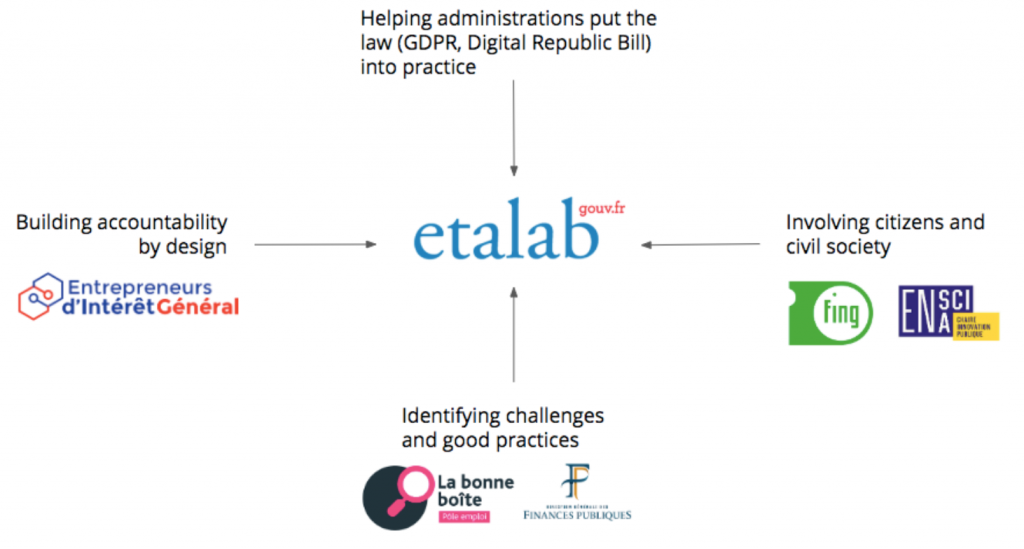Etalab: Algorithmic Accountability in the Public Sector
Background
While the use of algorithms in the public sector has been a common practice since the 1950s, it has become considerably more widespread through advanced computing and technology. Responding to this trend, the French government developed and introduced a new legal framework for algorithmic accountability and transparency in 2016. Since then, Soizic Pénicaud, Simon Chignard, and others (e.g., academics, public officials, etc.) at Etalab – the French government task force for open data, data policy, and open government launched in 2017 – have been working to determine how best to implement the framework and ensure government administrations comply with its obligations.
Goals, Processes, and Outcomes
Working directly with government agencies and the developers of their various digital systems and platforms, Etalab aims to enhance transparency and legibility so French citizens may better understand how these tools operate (e.g., algorithmic decision-making). To do so, Etalab writes guidelines and provides workshops for public sector agencies and administrations to help them determine whether or not their tools or systems are concerned with the legal obligations. This also puts the legal framework into plain language and outlines major challenges with algorithms.

Additionally, Etalab conducts in-depth case studies of specific administrative tools (e.g., unemployment website using machine-learning) in order to identify challenges with existing algorithms. In these cases, researchers observe 1) how public sector employees work with algorithmic systems, 2) how developers code such systems and arrive at particular decisions, and 3) how existing procedural documentation aligns with (or departs from) the legal requirements.
In collaboration with other civil society organizations, Etalab is also working to develop frameworks for the explanation of algorithms that are detailed and organized by publics and level of technical understanding, which helps agencies identify strategies from beginning to end in the development to implementation of new algorithms and tools.
Lessons and Challenges
Researchers at Etalab have identified several important lessons and challenges. First, it is challenging to articulate accountability to those who design algorithms and help them find ways to explain design choices to others. Here, another challenge lies in establishing what exactly constitutes a ‘choice’ for particular interface features to begin with and then communicating with developers to reach an understanding.
Another important consideration is the difficulty in defining what an algorithm is, as the majority of administrators, developers, and even citizens consider only those algorithms implemented via computer. Furthermore, there is no legal definition for an algorithm in France, making the task of enhancing accountability that much more challenging.
Next, due to the varied frameworks and guidelines that explain the importance of (and best practices for) algorithmic transparency and legibility, important questions emerge concerning the technicality of the language used in these explanations: to whom are these processes being explained? and, relatedly, how technical or legal should these explanations be?
Another lesson has emerged as developers begin focusing on artificial intelligence, as these systems are markedly less transparent than existing algorithms. Like this, it becomes increasingly important to focus on the tools and systems already in place before adopting new ones.
Finally, as the focus heretofore has been on government agencies and administrations, the space for citizen participation has been limited, which raises additional questions concerning the degree to which citizens should be involved in algorithmic design processes.
Next Steps
Building upon the work already underway at Etalab, next steps include further developing, distributing, and spreading online informational guides for algorithmic accountability within the public sector. In addition, researchers plan to meet with administrators and developers to test and observe if this guide is meeting their needs.
Related to the challenge of citizen participation, a main goal for 2020 is to create spaces wherein citizens and government agencies may meet and exchange ideas concerning algorithmic accountability. Here, Etalab aims to push the current discussion forward in new and innovative ways.
Additional Materials and Resources
Chignard, S., & Penicaud, S. (2019). “With great power comes great responsibility”: Keeping public sector algorithms accountable. (Working Paper.)
RightsCon 2019: How Etalab is working towards public sector algorithms accountability.
Contacts
Soizic Pénicaud, Open Innovation Officer, Etalab
soizic.penicaud@data.gouv.fr
Simon Chignard, Strategic Advisor, Etalab
simon.chignard@data.gouv.fr

